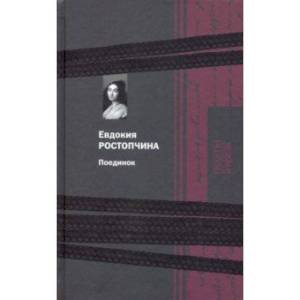Duel
Please sign in so that we can notify you about a reply
The literary work of Countess Evdokia Petrovna Rostopchina, according to the exact definition of V. Khodasevich, never subordinated the real world to the creative.
The circumstances of her life - in wealth, luxury, incredible circle of communication, but devoid of spiritual peace and prosperity - and were really akin to the novel ... Evdokia Rostopchina’s poetry is largely autobiographical and resembles a lyrical diary. This is how she recalls in the poem "Two meetings" about Pushkin:" He encouraged me with friendship without flattery, he wanted to scout my secret ... He told him the city’s rumor, that, nourishing his soul, and I, and I, and I, and I, and I, and I, and I, and He with "I believe: under one star we were born." M. Lermontov looked at me with curiosity ... I whispered poetry without art and the gaze of condescension was enthusiastic about ... "" The fight " - one of my first prose works - Rostopchin published in 1838 the son of the Fatherland magazine, then the story came out In the same book with other works under the general name "Essays on the Great Light". In them, Rostopchina defended the right of a woman to love, without hiding, blamed the highest light for appreciating people only from ranks and money, rebelled against a duel. H. Field, editor of the "son of the Fatherland", wrote down in his diary: "read the story by Rostopchina. How lovely! This is our Georges Zand. " Nevertheless, then the success of prose by Rostopchina was significantly inferior to her glory to the poetess
The circumstances of her life - in wealth, luxury, incredible circle of communication, but devoid of spiritual peace and prosperity - and were really akin to the novel ... Evdokia Rostopchina’s poetry is largely autobiographical and resembles a lyrical diary. This is how she recalls in the poem "Two meetings" about Pushkin:" He encouraged me with friendship without flattery, he wanted to scout my secret ... He told him the city’s rumor, that, nourishing his soul, and I, and I, and I, and I, and I, and I, and I, and He with "I believe: under one star we were born." M. Lermontov looked at me with curiosity ... I whispered poetry without art and the gaze of condescension was enthusiastic about ... "" The fight " - one of my first prose works - Rostopchin published in 1838 the son of the Fatherland magazine, then the story came out In the same book with other works under the general name "Essays on the Great Light". In them, Rostopchina defended the right of a woman to love, without hiding, blamed the highest light for appreciating people only from ranks and money, rebelled against a duel. H. Field, editor of the "son of the Fatherland", wrote down in his diary: "read the story by Rostopchina. How lovely! This is our Georges Zand. " Nevertheless, then the success of prose by Rostopchina was significantly inferior to her glory to the poetess
Author:
Author:Rostopchina Evdokia Petrovna
Cover:
Cover:Hard
Category:
- Category:Children's Book
- Category:Fiction
- Category:Modern Literature
- Category:Poetry & Literature
Publication language:
Publication Language:Russian
Paper:
Paper:white
Series:
Series: poets in verses and prose
ISBN:
ISBN:978-5-4224-1511-3
No reviews found
